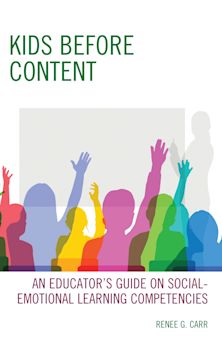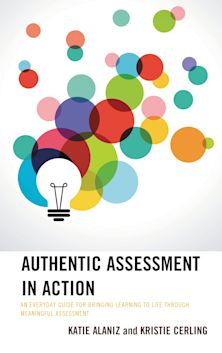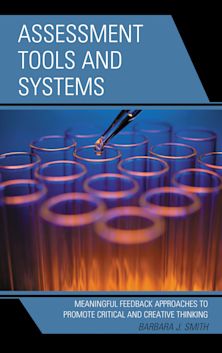- Home
- ACADEMIC
- Education
- Classroom Practice
- Breaking the Mold of Classroom Management
Breaking the Mold of Classroom Management
What Educators Should Know and Do to Enable Student Success, Vol. 5
Breaking the Mold of Classroom Management
What Educators Should Know and Do to Enable Student Success, Vol. 5
You must sign in to add this item to your wishlist. Please sign in or create an account
Description
Classroom management is often perceived as the most overwhelming challenge faced by new teachers; it may also continue to confront more experienced educators as they encounter a new group of youngsters or face a new set of demands. Successful classroom management is invariably tied to student engagement and empowerment: teachers who are singled out for excellent classroom management practices are often praised for successfully maintaining a strong instructional focus in their classes coupled with high levels of student motivation. The contributors offer classroom-tested strategies and timely advice on how to create such an effective and supportive instructional environment for academic and social-emotional learning for all.
Similar to the previous four volumes, Breaking the Mold of School Instruction and Organization: Innovative and Successful Practices for the 21st Century (2010), Breaking the Mold of Preservice and Inservice Teacher Education (2011), and,Breaking the Mold of Education for Culturally and Linguistically Diverse Students (2012), and, Breaking the Mold of Education: Innovative and Successful Practices for Student Engagement, Empowerment, and Motivation (2013), the purpose of this book is to offer a carefully selected collection of documented best practices and practical, classroom-tested strategies for immediate implementation
Table of Contents
Preface
Acknowledgments
Thinking Outside the Mold: How Teachers Learned to Make Classroom Management Work for Their Immigrant Latino StudentsCarrie Rothstein-Fisch and Elise Trumbull
Managing a Differentiated ClassroomMarcia B. Imbeau and Carol Ann Tomlinson
Implementing Self-Management Strategies in the Secondary ClassroomBrittany L. Hott, Jennifer D. Walker, and Frederick J. Brigham
Schoolize or Culturalize “Them” Within our Classroom CommunityHillary Merk
Classroom Management in the Corridor: Teacher-Student Negotiations of an Educational Authority Relationship Outside of the Classroom ContextAnneli Frelin
I’m Not a Reluctant Learner! I Just Need a Chance to Connect and Do Well in SchoolLou Denti
Mirrors and Master Switches: Using Interactive Root Metaphors to Support Students’ Academic, Social, and Emotional Growth and DevelopmentTerry Murray
Making the Work Interesting: Classroom Management Through Ownership in Elementary Literature CirclesRyan Flessner
Students as Allies to their Peers: Creating a Caring Majority Karen Siris
Cracking the Behavior Code: Effective Interventions for Students with AnxietyJessica Minahan and Nancy Rappaport
Warm Demander Pedagogy: Managing Behavior Through the 3 R’s of Insistence Barbara Berté, Micheline Susan Malow, and Diane W. Gómez
Civil Talks: Logistics of Managing Online Classroom SpacesJeffrey P. Drake and Jeanette L. Drake
Culturally Relevant Cyphers: Rethinking Classroom Management Through Hip Hop Based EducationBettina L. Love
Flipping the Cultural Revolution Jon Nordmeyer and Peter Stelzer
Promoting Mutual Respect and Democratic Practice in Diverse Learning Communities to Support Positive Classroom ManagementJennifer Lauria
Classroom Management Strategies to Increase Student Collaboration Maria G. Dove and Vicky Giouroukakis
Defusing Conflict in the Classroom with Restorative Practices Luanna H. Meyer and Ian M. Evans
Managing Math and Supervising Spanish Establishing and Maintaining Positive Classroom Culture in the Middle SchoolMartha Edelson and Lori Langer de Ramirez
Classroom Management from an Organizational Perspective: Positive Behavioral Supports at the System, School, and Staff LevelsHoward M. Knoff
Twenty-first Century Classroom Management: It is Time for a New PerspectiveMarie Menna Pagliaro
Afterword
Building Resiliency in Students and Educators: Key Ideas from Research and Practice
Bryan Harris
Contributors
Product details
| Published | 11 Dec 2013 |
|---|---|
| Format | Ebook (Epub & Mobi) |
| Edition | 1st |
| Extent | 174 |
| ISBN | 9781475803495 |
| Imprint | R&L Education |
| Publisher | Bloomsbury Publishing |
About the contributors
Reviews
-
Classroom management issues are a constant topic of discussions in this reviewer's graduate courses despite the course focus on teaching and planning effective reading instruction. Furthermore, classroom management issues continue to be one of the reasons why many novice teachers leave the classroom in their first three years of teaching. Editors Honigsfeld and Cohan provide educators with 20 brief yet concise chapters addressing a wide spectrum of classroom management issues. Written by respected educators known for their expertise in classroom management, the chapters provide readers with down-to-earth yet research-based strategies, practices, and perspective that can be implemented tomorrow. Just as important, this text reminds readers that maintaining respect for students and creating environments for positive self-worth are critical components to effective classroom management. Moving from traditional topics surrounding classroom management, this book also offers readers insight into management of online classrooms, cultural issues leading to challenging classroom management situations, and administrative perspectives at the district and building level. Breaking the Mold of Classroom Management is an excellent resource for preservice and veteran teachers as well as teacher educators. Summing Up: Highly recommended. Upper-division undergraduate, graduate, research, and professional collections.
Choice Reviews
-
This fifth book in the Breaking the Mold series addresses classroom management from a 21st Century perspective. It is a valuable resource not only for pre-service and newly-hired teachers, but for all teachers who are committed to creating vibrant learning environments where active student engagement, high expectations, a collaborative spirit, and a culture of respect permeate the atmosphere. The practical strategies presented in the book will assist teachers in transitioning from controlled learning environments to classrooms where shared leadership is evident.
As the roles of leaders and learners blur within a classroom and the borders of classrooms blend into a larger learning environment, this resource will provide valuable guidance to teachers, learners and leaders on all levels.
The importance of integrating voice and choice into effective learning environments is emphasized throughout the book. A focus on individual needs (academic and social) within a collaborative setting helps highly effective teachers promote student success. The active engagement of students in lesson design, assessment and interpersonal relations is also a cornerstone of the highly effective classroom. The practical suggestions presented by the contributors of this book will help teachers develop practices to support the establishment of these elements within their classrooms.Ann V. Peluso, assistant superintendent, West Hempstead School District, New York
-
Breaking the Mold of Classroom Management makes a much-needed contribution to the educational field. The authors correctly target classroom management as one of the most vexing issues for teachers. Through highlighting innovative teaching practices in a wide variety of contexts, backed by solid theoretical support, the book extends our understanding of how best to manage the classroom. A particular strength is the book's attention to classroom management not only in the classroom, but also in the hallways and online. I appreciated also acknowledgment of trust, caring, and respect as important considerations for supporting positive classroom management.
Thomas G. Reio, Ph.D., Associate Dean of Graduate Studies, College of Education, Florida International University
-
Breaking the Mold of Classroom Management blends thoughtful research and effective practice with the accessibility and believability of lived experiences in 21st century K-12 classrooms. In this volume, a diverse array of scholar-practitioners offers something for anyone seeking clarity on progressive approaches to classroom management.
Marlon C. James, Ph.D., Loyola University, Chicago, IL



































